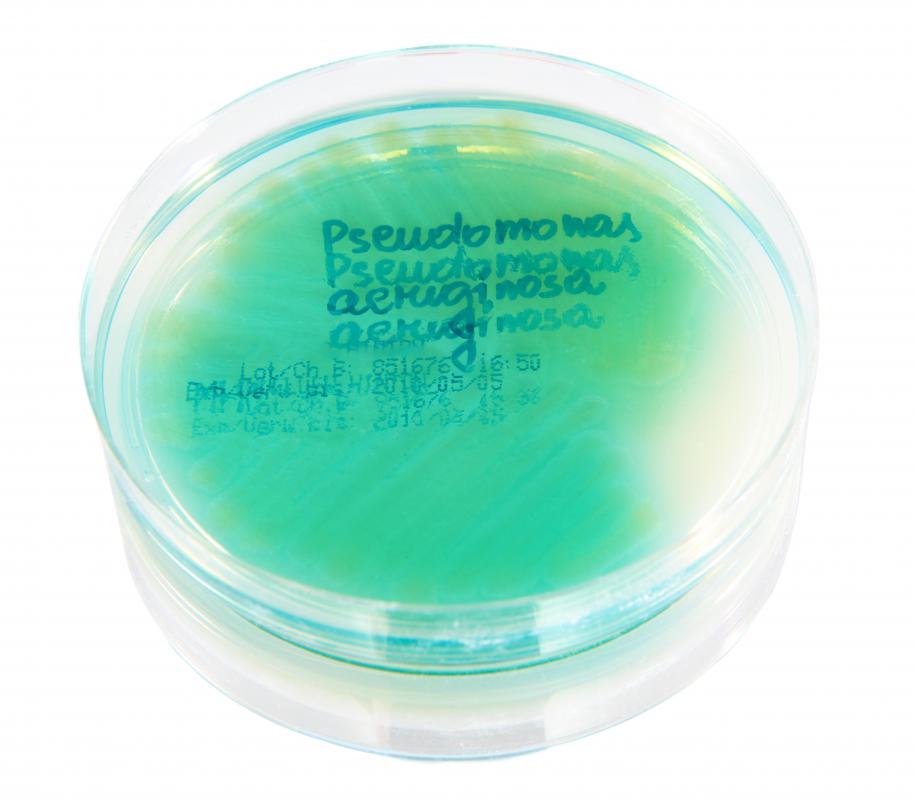At WiseGEEK, we're committed to delivering accurate, trustworthy information. Our expert-authored content is rigorously fact-checked and sourced from credible authorities. Discover how we uphold the highest standards in providing you with reliable knowledge.
What Are the Different Types of Pseudomonas Infections?
The Pseudomonas genus of bacteria are common environmental bacteria, and the most important pseudomonas in medical issues, Pseudomonas aeruginosa, lives on about half of the human population. A wide array of Pseudomonas infections affect humans and other animals, such as pneumonia, urinary tract infections, heart infections, ear infections and infections of the joints. Although the genus is ubiquitous in the environment, the bacteria tend to be opportunistic pathogens, which means that they generally become dangerous only in sick people.
Pseudomonas species tend to like living in areas that are moist, such as soil or water. They also survive well in sinks, hot tubs and swimming pools that have low chlorine levels. When they infect people, they live in the intestines, in ears or on skin.

The most medically important species, Pseudomonas aeruginosa, is resistant to salt, some antiseptics and some antibiotics. Pseudomonas aeruginosa also can survive with limited nutrients. All of these characteristics mean that pseudomonas infections are a significant part of hospital-acquired infections.
Pseudomonas aeruginosa infections are the top cause of potentially lethal pneumonia in hospital patients who use a ventilator or who are in intensive care. This type of bacteria also is a major cause of infection in patients who have cystic fibrosis, cancer and burns, with about half of the affected patients dying from the infection. Other hospital-acquired types of pseudomonas infections are urinary tract infections, surgical incision infections and blood poisoning. Sometimes bacteria that have invaded the blood can pass into bone and joints and cause infection. The bacteria might also cause heart infections through intravenous drug use or from heart valve surgery.

Outside of the hospital, pseudomonas infections are the most common cause of ear infections and corneal ulcers. The bacterium can also infect the eyes of contact lens users and is a common cause of urinary tract infections. Pseudomonas aeruginosa can also infect the soft tissue, the joints or the bone of the body when it is introduced through puncture wounds. Bacteria present in inadequately sanitized water can also cause "swimmer's ear" or a disease called folliculitis, which infects hair follicles in skin, usually in people who use hot tubs.

Some bacterial species that were previously included in the Pseudomonas genus have been renamed because of genetic classification systems. These bacteria might still be referred to as pseudomonas but are more correctly known by their new names. For example, the Burkholderia name has replaced Pseudomonas in some medically relevant species such as Burkolderia cepacia and Burkolderia pseudomallei. These bacteria also cause opportunistic infections.
AS FEATURED ON:
AS FEATURED ON:














Discussion Comments
I freaked out when I started getting a rash on my legs after sitting in a hotel hot tub. Little red bumps were all over my legs, and they appeared to have pus in them.
I also noticed that I felt very tired for no reason. I went to my doctor, and he told me I had hot tub folliculitis. He said that I should try silver sulfadiazine cream first, because antibiotics would only be necessary if it refused to go away in a week.
My doctor told me that if the water in hot tubs is not filtered out often, then people's dead skin accumulates in there, and that can cause infections. The hotel wasn't the most sanitary I've stayed in, so they probably didn't take good care of their hot tub.
Swimmer's ear can be incredibly painful. My husband had it last year, and he had to miss work because it hurt so much.
When he first got it, he just had mild pain and itchy ears. After several days, the pain had increased, and his ears had swollen so much that the hole was almost closed off.
I had been having a lot of trouble keeping my pool clean that year. I was so busy that I forgot to put shock in it for a couple of weeks, and I asked my cousin to put chemicals in it while I was on vacation, but she forgot. So, the pool went an entire month without being properly balanced.
I tried to get the balance right when I returned, but it was hard. We swam in it while it was still unclean, and I think that's why he got swimmer's ear.
@lighth0se33 – Did you know that it has been scientifically proven that cranberry juice can protect you from certain infections? I seemed to get sick a lot more often before I started drinking two glasses a day.
I read that cranberry juice has some sort of molecule in it that coats your insides and keeps bacteria out. This works for pseudomonas infections as well as for some viruses, like the flu.
I will do everything I can to protect myself from getting sick, and if cranberry juice is all it takes to prevent a bacterial infection, then I should be pretty healthy. I have had my share of ear infections in the past, and I could do without ever going through that pain again.
I've never had to be in the hospital for any length of time, but I have gotten many urinary tract infections that began in my own body. I have a kidney condition that makes me predisposed to them, and the bacteria take advantage of this on a regular basis.
What I notice first is a warm sensation and cramps in my lower abdomen. I have to pee very often, and the pee feels hotter than normal.
If I go too long without getting treatment, I develop a fever and pain in my kidneys. One time, I even vomited. That made me go to the doctor right away.
Antibiotics have always been effective in treating my urinary tract infections. I find that drinking cranberry juice can help as well, and it can even prevent them if I drink it every day.
Post your comments